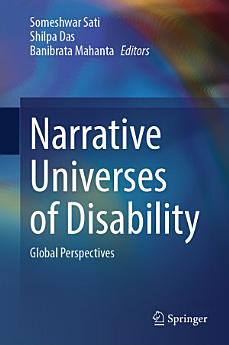Narrative Universes of Disability: Global Perspectives
About this ebook
About the author
Someshwar Sati is Professor of English and Coordinator, Centre for Disability Studies and Research, Kirori Mal College, University of Delhi, India. He is currently Chairperson, Indian Disability Studies Collective. His recent works include three edited volumes titled Disability in Translation: The Indian Experience (Routledge 2020, with GJV Prasad), Reclaiming the Disabled Subject: Representing Disability in Short Fiction (Bloomsbury 2022, with Ritwick Bhattacharjee and GJV Prasad), and Retrieving the Crip Outsider: Representations of Disability in Literature and Culture (Bloomsbury, 2024). He is also a recipient of the National Award for the Empowerment of Persons with Disability (2022) in the category of Sarvashresth Divyang bestowed by the Ministry of Social Justice and Empowerment, Government of India.
Shilpa Das is Professor, Interdisciplinary Design Studies and leads the Master’s programme in Film and Video Communication, across the three campuses of the National Institute of Design, in Ahmedabad, Gandhinagar and Bengaluru, India. She is currently Vice-Chairperson, Indian Disability Studies Collective. Her research, teaching, and published work span disability studies, comparative aesthetics, Indian narrative traditions, Indian writing in English, translation, inclusive design and accessibility, human-centred design, design history, eco-social literacies, and public health. Some of her recent works are the edited issue of the American journal, Global Health: Science and Practice (2021) titled ‘Design for Health: Human-Centred Design Looks to the Future’ and an English translation of the French book Maman (Little Latitude, 2024).
Banibrata Mahanta is Professor of English at Banaras Hindu University, India. He is currently Vice-chairperson, Indian Disability Studies Collective. His areas of interest include Indian Writing in English, Indian nationalist thought, disability studies, and translation. Some of his recent works include the edited volume English Studies in India: Contemporary and Evolving Paradigms (Springer 2019) and an English translation of the Hindi novel Lavanyadevi (Orient Blackswan, 2024) for which he was awarded the PEN/Heim Translation Fund Grant (PEN America) in 2021.








